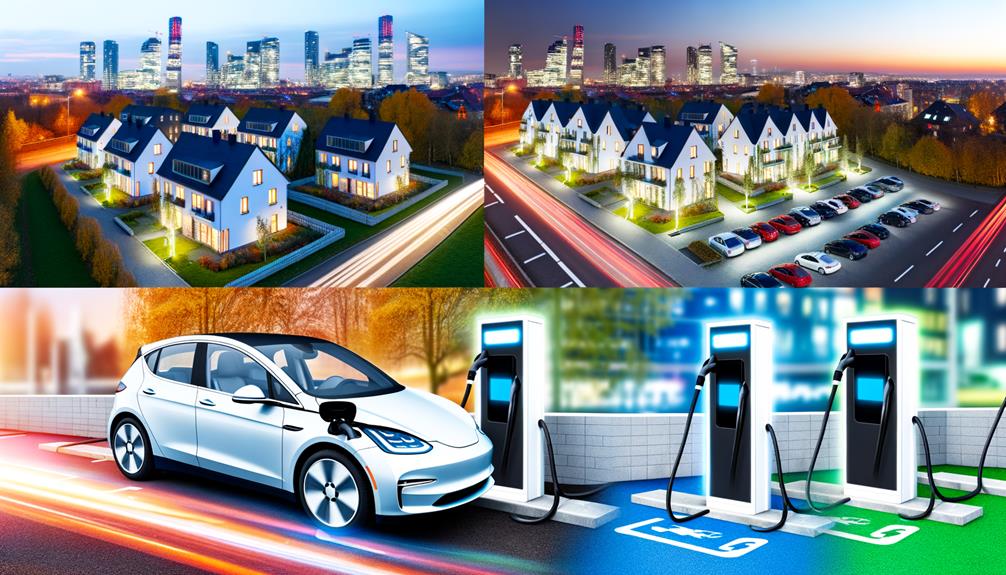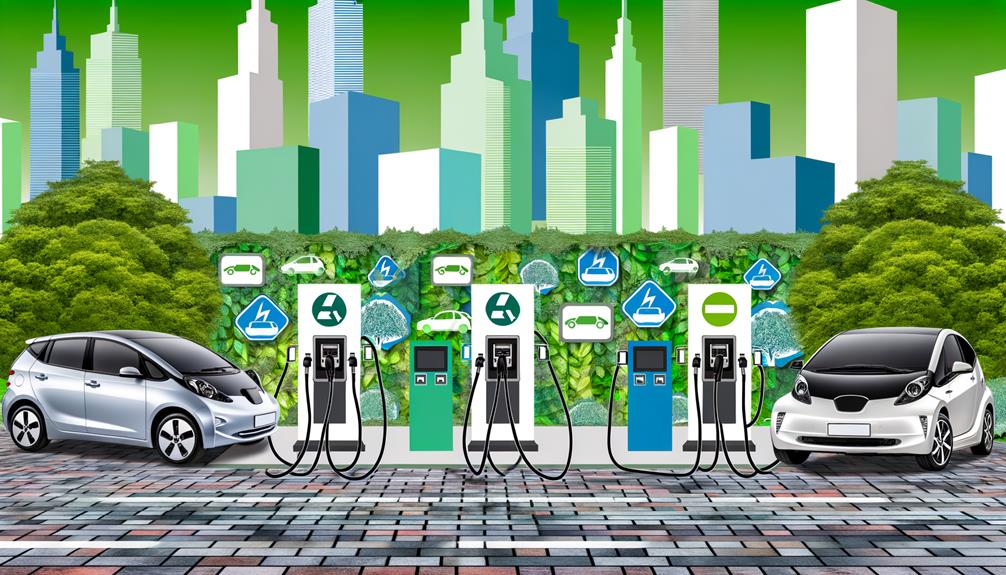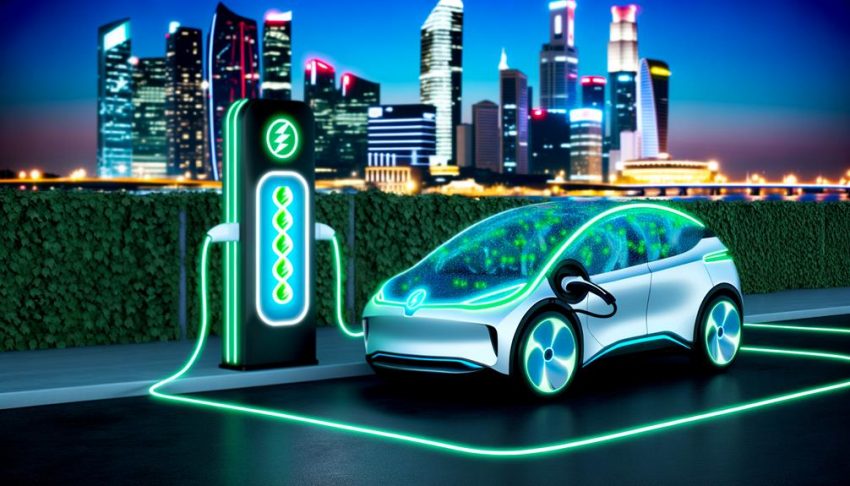You might be wondering if all those electric car charging points you see around town are free. Well, the answer isn't as straightforward as you might think. While about a third of public charging stations in places like Houston do offer complimentary access, the availability and convenience can vary greatly. Some are located in high-traffic areas like malls or universities, and others might be part of incentives provided by automakers for new buyers. But what about the rest? There are several factors to take into account, and understanding these could be essential for your EV ownership experience.
Contents
Overview of Free EV Charging
Taking advantage of free EV charging options can greatly enhance the convenience and affordability of owning an electric vehicle. Approximately 33% of public charging station ports in Houston offer free charging, making it easier for you to keep your EV powered up without additional costs. These stations are often strategically placed in high-traffic areas like malls, universities, and public transit stations, so you won't have to go out of your way to find free charging facilities during your daily routines.
To efficiently locate free EV charging stations, you can use various charging apps. Apps like PlugShare and ChargePoint are particularly useful as they allow you to filter results based on availability and charger types, ensuring you find the most suitable free EV charging options near you. These apps can also provide real-time updates on the status of public charging stations, helping you avoid unnecessary trips to occupied or malfunctioning chargers.
Moreover, some national parks are equipped with free EV charging stations, promoting eco-friendly tourism. This enables you to enjoy your visit to natural attractions while your vehicle charges, seamlessly integrating environmental responsibility with leisure.
Automakers often sweeten the deal for new EV purchasers by offering free charging incentives. These can include complimentary charging credits or subscriptions, which can be a significant cost-saving perk during the initial ownership period. Taking advantage of such offers can further enhance the affordability of owning an electric vehicle.
Locations for Free Charging
You'll find free electric vehicle charging stations in a variety of convenient locations, including shopping malls and retail centers where you can charge your car while you shop. Educational institutions like universities also offer complimentary charging options, making it easier for students and staff to maintain their EVs. These accessible locations enhance the practicality of owning an electric vehicle, ensuring that you can stay charged up during your daily activities.
Malls and Retail Centers
Many large retail chains, including Macy's, Kohl's, and Whole Foods, have integrated free EV charging stations into their parking lots to encourage longer shopping durations and boost customer loyalty. These EV charging stations at malls and retail centers often utilize Level 2 charging stations, which provide approximately 20 miles of range for every hour of charging. By offering free electric vehicle charging, these shopping malls create a positive shopping atmosphere and increase foot traffic.
Retail locations leverage free charging as a customer incentive. Here are some key benefits:
- Convenience: Shoppers can charge their EVs while they shop, making it easy to integrate charging into their daily routines.
- Cost Savings: Free charging reduces the overall cost of owning and operating an electric vehicle, making it more attractive to potential buyers.
- Environmental Impact: Promoting the use of electric vehicles helps reduce carbon emissions, aligning with sustainability goals.
- Additional Perks: Some retailers offer discounts or rewards programs for using their charging stations, enhancing the overall shopping experience.
The availability of free charging at malls and retail centers not only promotes the adoption of electric vehicles but also guarantees charging is accessible and convenient for shoppers.
Educational Institutions
Educational institutions are becoming pivotal players in the push for sustainable transportation by installing EV charging stations on their campuses. Many colleges and universities are taking significant steps to support electric vehicles (EVs) as part of their sustainability initiatives. For instance, Santa Clara University and the University of Florida have partnered with ChargePoint to provide free charging options, not just for students, faculty, and staff, but often for visitors as well.
These institutions are fostering environmentally conscious behavior by making it convenient to charge electric vehicles. However, while free charging is a common benefit, it often comes with certain restrictions. You might need a parking permit, or there could be time limits to guarantee fair and efficient use of the resources. These measures help manage the demand and promote a more equitable system for all EV users on campus.
This growing trend among universities reflects a larger commitment to eco-friendly transportation solutions. By enhancing their EV infrastructure, educational institutions are not only supporting current EV owners but also raising awareness about the benefits of electric vehicles. This, in turn, encourages more people within the campus community to contemplate switching to EVs, further supporting sustainability goals.
Types of Free Chargers

When looking for free chargers, you'll often find Level 2 charging stations at malls, universities, and public transit stations, providing about 20 miles of range per hour. These locations not only make charging convenient but also support eco-friendly practices and attract more visitors. You can easily locate these free charging spots using apps like PlugShare and ChargePoint, which list venues such as hotels and national parks that participate in sustainability initiatives.
Common Free Charging Locations
Electric car charging points have become increasingly accessible at various establishments, offering you convenient and often free charging options. You'll find free charging stations in numerous locations, each providing unique benefits.
- Large Chain Businesses: Retailers like Whole Foods and Cinemark have installed free EV charging stations in their parking lots. These public EV charging points encourage you to spend more time shopping or enjoying a movie, thereby increasing customer foot traffic for the business.
- Hotels: Certain Marriott and Hilton locations offer complimentary EV charging for guests. Typically found in hotel parking areas, these Level 2 chargers enhance your overall guest experience by providing a convenient and eco-friendly service during your stay.
- Colleges and Universities: Many higher education institutions are now offering free EV charging stations for students, faculty, and staff. Some even allow visitors to charge at no cost, integrating these stations as part of their sustainability initiatives.
- National Parks: Across the U.S., over 140 National Park locations feature free charging stations. Notable examples include Death Valley, where solar-powered Level 2 chargers promote eco-friendly tourism.
In addition, commercial promotions, such as those by Volta, provide free Level 2 charging in exchange for viewing advertisements, blending convenience with consumer engagement.
Benefits of Free Charging
Free electric vehicle charging stations, found in retail locations, educational institutions, and public parks, offer a range of benefits to EV owners and the broader community. For EV drivers, having access to free charging stations can greatly reduce the overall cost of vehicle ownership. Many of these charging stations are Level 2 chargers, providing about 20 miles of range in one hour. This makes them ideal for longer activities like shopping, dining, or attending classes.
Retailers and hotel chains often offer complimentary charging as an incentive to attract and retain customers. For instance, Whole Foods and major hotel brands provide free charging stations, enhancing the shopping and lodging experience while promoting sustainability. This not only benefits EV drivers but also encourages eco-friendly practices among the public.
In addition, national parks across the U.S. have installed over 140 chargers, including solar-powered options, supporting sustainable tourism. Visitors can explore nature without worrying about running out of charge, making it easier to adopt greener travel habits. Automakers also offer incentives like complimentary charging credits, further reducing ownership costs and making electric vehicles more appealing.
Free charging stations consequently play an essential role in fostering an eco-friendly community and making electric vehicle ownership more accessible.
Finding Free Chargers
In addition to the growing number of paid charging options, finding free electric vehicle (EV) chargers is becoming easier, thanks to their increasing presence in various locations. As an EV owner, you'll find free charging stations in places you frequent, allowing you to power your vehicle without extra costs.
Here's where you can find free chargers:
- Retail Locations and Malls: Many retail centers and malls have installed EV charging stations where you can charge your vehicle for free while you shop or dine.
- Educational Institutions: Colleges and universities often provide free charging stations for students, faculty, and sometimes visitors, making it convenient to charge while attending classes or campus events.
- National Parks: Over 140 national parks in the U.S. offer EV charging stations, some of which provide free Level 2 charging, often powered by renewable energy sources.
- Commercial Promotions: Companies like Volta offer free Level 2 charging at certain locations in exchange for viewing advertisements, enabling you to charge your vehicle without spending a dime.
Additionally, many automakers include free charging incentives with new EV purchases, such as charging credits or subscriptions, further enhancing the appeal of electric vehicle charging. By taking advantage of these opportunities, you can greatly reduce your charging expenses.
Finding Free Charging Stations
Locating free charging stations is easier than you might think, especially if you know where to look. Popular spots like malls, universities, and public transit stations often provide free charging stations. Retailers such as Whole Foods and Macy's offer complimentary charging to enhance customer experiences, making shopping trips even more convenient for EV owners. When you're out and about, these locations can be a reliable source for finding free charging ports.
To make your search even simpler, apps like PlugShare and ChargePoint are invaluable tools. These apps allow you to filter based on availability, type of charger, and whether the charging is free. They even provide real-time data, ensuring you don't waste time driving to a station that's already in use. By using these apps, you can efficiently find free charging stations near you.
Some towns and local utilities also promote clean energy by operating free public charging programs. For instance, over 33% of charging ports in Houston offer free options, making it a prime example of a city committed to supporting EV adoption. Additionally, national parks and recreational areas are joining the eco-friendly movement by featuring free charging stations. There are over 140 chargers available across 23 national parks, ensuring you can explore nature without worrying about your EV's battery.
Automakers sometimes offer free charging incentives with certain vehicle models. For example, Kia provides 1,000 kWh of free charging for three years with its EV6 and EV9 models, giving new owners an added benefit. By leveraging these resources, you can maximize the convenience and cost savings of owning an electric vehicle.
EV Charging Incentives

When it comes to maximizing the benefits of owning an electric vehicle (EV), EV charging incentives can greatly enhance your experience. Various programs and incentives from automakers, charging networks, and retailers are designed to make your change to an electric lifestyle smoother and more cost-effective.
Many automakers offer free charging incentives for new EV buyers. For instance, Tesla's complimentary charging promotions allow new owners to enjoy free charging at Tesla Supercharger stations. Similarly, Kia offers 1,000 kWh of free charging over three years with select models, providing a substantial amount of free energy.
Charging networks also play an essential role in incentivizing the use of their stations. Electrify America, for example, provides free DC fast charging for the first 30 minutes for select EV models. This not only attracts users to their network but also offers a quick and cost-effective way to recharge your vehicle. In addition, the EVgo Rewards program allows users to earn points toward free charging. Accumulate 2,000 points, and you'll receive $10 worth of free charging, making frequent use of their network even more rewarding.
Retailers and public spaces often offer free charging to attract and retain customers. Many Whole Foods locations and major shopping centers feature free Level 2 electric vehicle charging stations. This encourages longer shopping durations while providing a convenient service. Moreover, free charging options are available at various hotels, educational institutions, and national parks. These venues provide free charging as part of their commitment to eco-friendly travel and sustainability initiatives.
Here are some key incentives that provide free charging:
- Automaker Promotions: Free charging offers from Tesla and Kia.
- Charging Network Offers: Electrify America's free DC fast charging.
- Rewards Programs: EVgo Rewards points system.
- Retailer and Public Space Initiatives: Free Level 2 charging at Whole Foods and other locations.
Cost Comparison With Paid Charging
Free EV charging stations can be a game-changer for electric vehicle owners looking to cut costs. When comparing free charging stations with paid ones, the savings can be considerable. Free charging stations typically offer Level 2 charging, delivering about 20 miles of range per hour. In contrast, paid charging stations often range from $0.30 to $0.60 per kWh. This can result in a full charge costing anywhere from $11 to $50, depending on your Electric Car's battery capacity and the rate of the paid charging station.
Here's a quick comparison:
| Charging Type | Cost to Charge (Full Charge) | Range Added per Hour |
|---|---|---|
| Free Charging | $0 | 20 miles |
| Paid Charging | $11 – $50 | Varies |
Approximately 33% of public charging ports in Houston offer free charging, making it easier for EV owners to find and use these cost-effective options. While free charging might be slower, the financial benefits are undeniable, especially when gas prices are over $4 per gallon. Over time, the savings from using free charging stations can add up, appreciably reducing your overall travel expenses compared to gasoline-operated vehicles.
Utilizing free charging stations can help you keep your operating costs low. Although the charging speed is slower, the cost savings are considerable. With the average cost to charge an Electric Car at paid stations being much higher, free charging options offer a compelling way to minimize expenses. This makes free charging stations not just a convenience but a valuable resource for managing your EV's running costs effectively.
Frequently Asked Questions
Is It Free to Use Electric Car Charging Points?
You'll find some electric car charging points are free, especially in high-traffic areas. Incentive programs and charging networks offer cost comparisons. User experiences highlight free charging as a perk, with apps aiding in locating these stations.
How Much Does It Cost to Charge an Electric Car at Walmart?
At Walmart locations, charging costs depend on the charging networks used and your membership benefits. Charging speed varies, with Level 2 chargers offering 20 miles per hour. Compare costs on apps like PlugShare or ChargePoint for accuracy.
How Long Does It Take to Charge an Electric Car at a Public Charging Station?
Charging an electric car at a public station depends on charging speed, battery capacity, and charger types. Level 2 chargers take 4-6 hours, while Level 3 chargers take 30 minutes. Charging networks help manage range anxiety by providing real-time availability.
Is EV Charging Cheaper Than Gas?
Yes, EV charging is cheaper than gas. Electric vehicle savings are substantial due to home charging options and charging station accessibility. For long distance travel, energy source impact is minimized, making EVs more economical compared to gasoline.
Conclusion
To sum up, finding free electric car charging points isn't as challenging as you might think. With around 33% of public stations in cities like Houston offering complimentary access, you'll often find them in busy areas like malls and universities. Automakers also sweeten the deal with charging incentives for new buyers. By leveraging these free options, you'll not only save on costs but also contribute to a more sustainable and eco-friendly travel experience.
